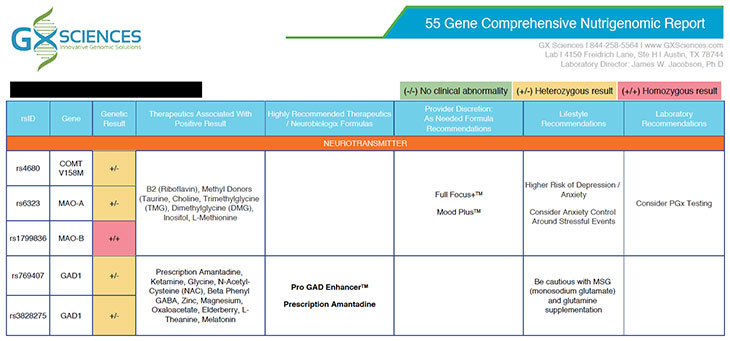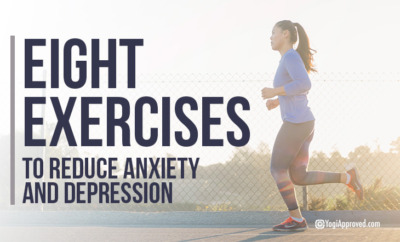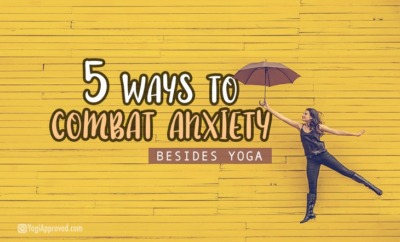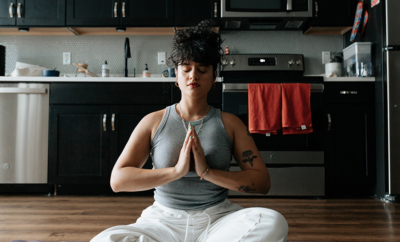Yoga Not Helping Your Anxiety? This Doctor Explains Why Your Genes Might Be the Root Cause of Your Anxiety

Many of you sought out yoga to help decrease anxiety in your life. Focusing on breathing, posture, and fluidity during yoga helps to decrease cortisol (your stress hormone), allowing your body to feel at peace.
Unfortunately, some of you may still be looking for the magical yoga class that melts away all of life’s stressors. Maybe you’re frustrated because no matter how much meditation or ujjayi breath you practice, your anxiety is still there.
The Link Between Anxiety and Genetics
I work with many patients who struggle with anxiety. Some of these patients have health conditions that affect the neurotransmitters (feel good hormones) in their gastrointestinal tracts and brains. Conditions such as Lyme Disease and hypothyroidism classically cause anxiety.
Did you know Lyme Disease is on the rise? Here’s How Lyme Disease Became One of the Top Ten Most Googled Conditions
Medications may not always solve the problem, as medications do not address the underlying causes: infections, inflammation, and hormone dysregulation.
In many patients with anxiety, their doctor has tried addressing the condition that may cause the symptoms, but the result is the same: anxiety persists, which eventually turns into depression.
Anxiety and genetics are very intrinsically connected.
Does this mean you should you take two yoga classes a day? Ground yourself more? Turn off social media? Quit your job? No! Actually, anxiety and genetics are very intrinsically connected.
What if I told you that your genes may be causing your anxiety symptoms, and no matter how much you practice yoga, your symptoms may still hang around? That’s right – your anxiety could have been passed down to you!
Every new patient I work with is asked to run a genetic test to determine if any of their health symptoms are caused by faulty, broken, or mutated genes.
Take a Look at These Two Case Examples That Prove the Link Between Anxiety and Genetics:
Both of these patients contacted me because they were struggling with anxiety and depression. These patients told me, “Dr. King, my life is great! I love my job/school. My family life is solid. But, I can’t control my anxiety. It seems to come out of the blue!”
Unfortunately, these two patients had been seeing psychiatrists who put them on anti-depressants and anti-anxiety medications which began causing more symptoms. Both patients ditched the medications due to the increase in symptoms and sought my help.
Patient #1
- Age: 34
- Sex: female
- Chief complaint: anxiety and depression that comes out of nowhere
- Medications: Xanax and Abilify Medical history: Hashimoto’s Disease which was incorrectly diagnosed as hypothyroidism

What are we looking at in this test result? Let me explain.
On the left-hand column, you will see the gene (i.e. COMT V158M) and the result (i.e. +/+; red). Next to the colored column, is a list of vitamins/minerals that help support the genetic mutations, followed by the next column that lists a specific product that combines the vitamins/minerals into one supplement. Lifestyle recommendations are listed to the right, along with a recommendation for further testing.
Now that you know what you are looking at, let me explain genetic mutations and how they impact your emotions.
The genes that are listed help your body perform physiological functions to help you feel well. If those genes are mutated (AKA: altered or broken), your body will have a difficult time performing its duties.
Since we are looking at the neurotransmitter (feel good hormones) genes, you can expect to get some answers to solve your anxiety problems if the genes are mutated.
Let’s start with the first two genes: COMT V158M and COMT H62H (Catechol-O-methylatransferase). When these genes are “normal” (not mutated), they allow people to rapidly reverse feelings of anxiety or depression.
Patients that have mutations in these genes have a sluggish ability to alter anxiety or depression episodes, and are more prone to prolonged episodes of anxiety, depression, and OCD.
The next gene that is mutated in this patient is called GAD1 (Glutamic Acid Decarboxylase). When this gene is mutated a person has a difficult time converting glutamic acid (a stimulant neurotransmitter) to GABA (a calming neurotransmitter).
What does that mean? If your body is being overstimulated due to high levels of a “stimulant” and you can’t calm down because your “calming” neurotransmitter is low, you will struggle with anxiety, sleep disorders, and/or the “glass half empty” syndrome.
Do you think the medications prescribed to this patient addressed these mutated genes? No, not at all. Hence, the patient was not feeling better.
So, what was her treatment? I had her take a supplement that contains many of the vitamins/minerals that were listed in the results. And we addressed her autoimmune condition, as well.
And, bam! She was a happy camper after two weeks of being on her genetic support.
Diagnosed With an Autoimmune Disease? This Integrative Doctor Explains What to Do Next
Patient #2
- Age: 22
- Sex: female
- Chief complaint: anxiety, which led to depression along with the inability to focus at school and while studying
- Medication: Ritalin

She, too, has a mutation impacting her COMT V158M gene. This creates difficulty to reverse feelings of anxiety and depression.
She does have two mutations of the MAO gene (A and B). These two genes degrade (breakdown) the neurotransmitter dopamine. If the body can’t degrade dopamine, a person will have risk of clinical depression, mood disorders, and aggression.
You will see she does have two mutations of the GAD1 gene, similar to the first patient.
Medications did not help this patient but addressing her genetic mutations did.
Anxiety and Genetics: Where Does This Leave You?
We all are faced with triggers that can cause neurotransmitter hormones to be released in our bodies. Genetically, healthy individuals should be able to adapt to those hormones being released and still feel well.
But, when the genes are mutated, you may still have anxiety/depression regardless of your rocking yoga practice because your genes are not doing their job.
What Should You Do About Anxiety and Genetics?
If you have tried other means to control your anxiety symptoms, but you are still struggling, think about talking to your doctor about genetic testing. Most traditional medical doctors are not educated on genetic mutations and may not know how to handle them.
One way to find a doctor with experience in this field is to contact GX Sciences. They are the company that runs the genetic testing we looked at. Ask them for a list of doctors in your area with training in genetic mutations.
Don’t give up hope if you are still struggling with anxiety or depression. Keep searching for answers. All you may need are a few more pieces to your health puzzle to help you achieve your goal(s).
All included information is not intended to treat or diagnose. The views expressed are those of the author and should be attributed solely to the author. For medical questions, please consult your healthcare provider.


This Month's Letter
From the Editor
Monthly motivation and food for
thought from our founder.































Comments